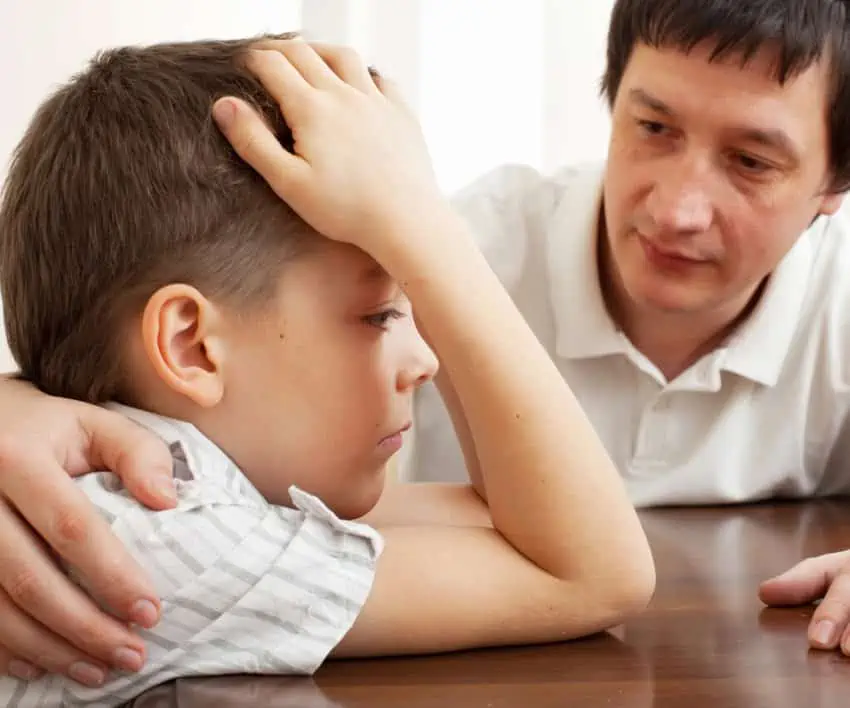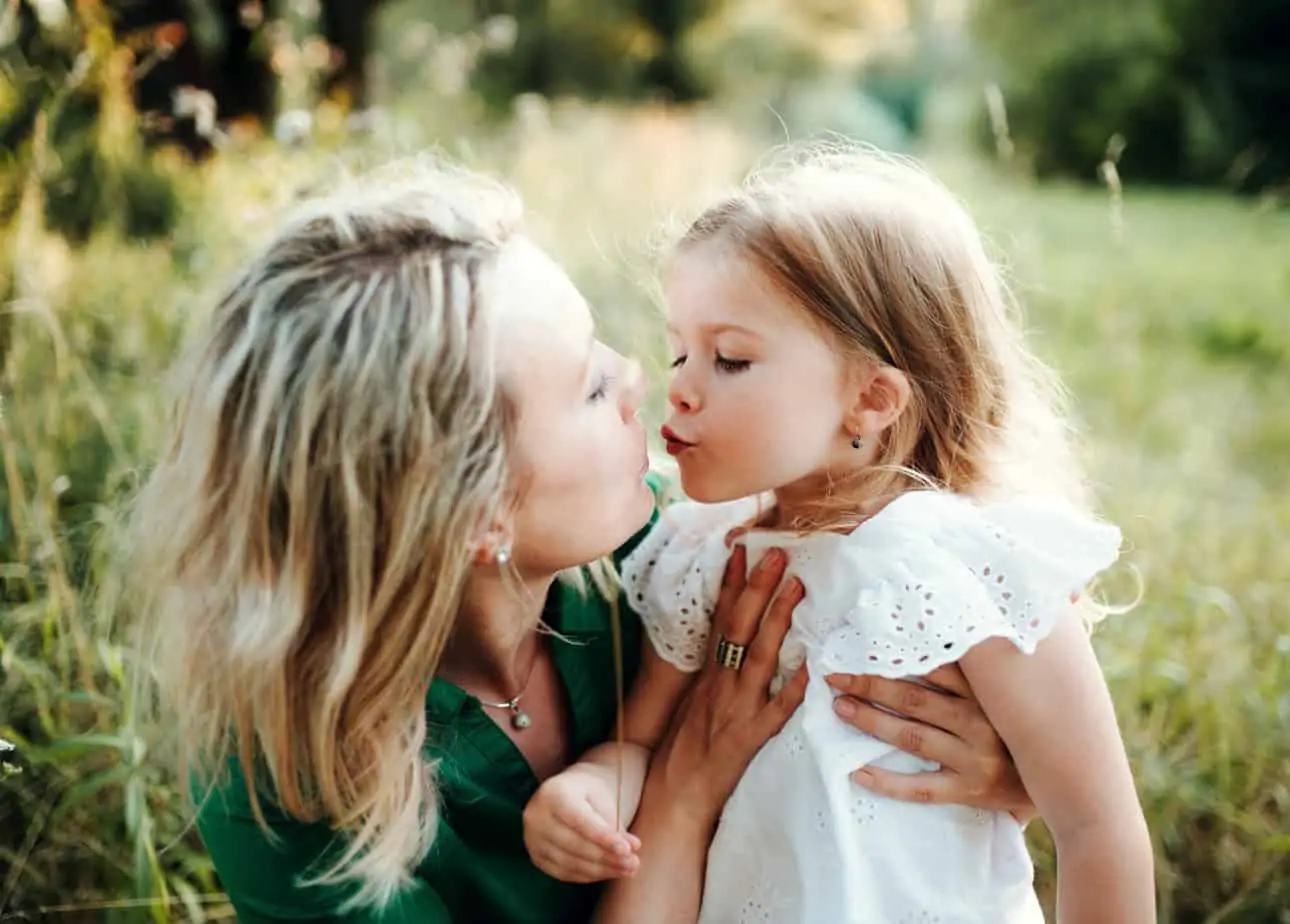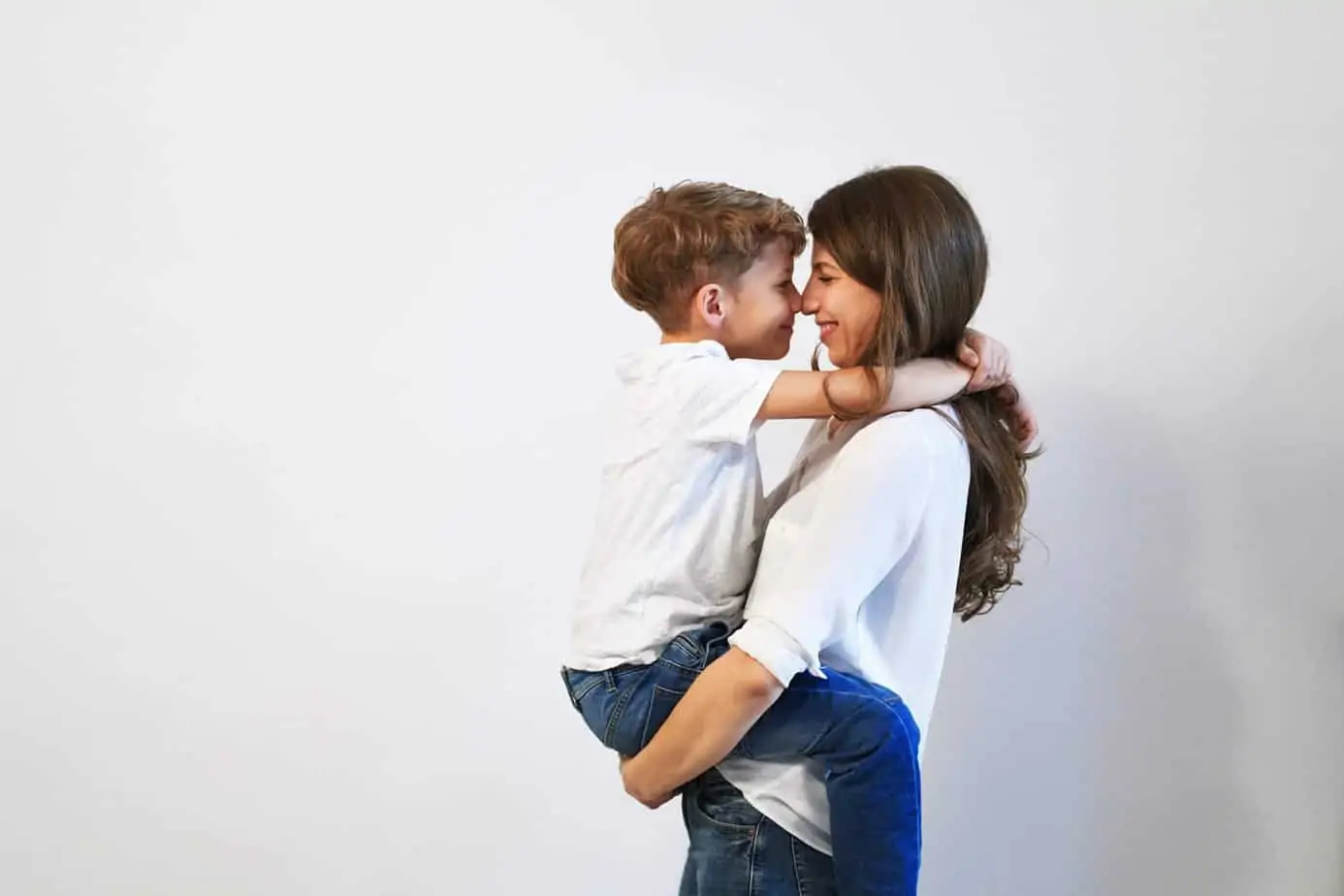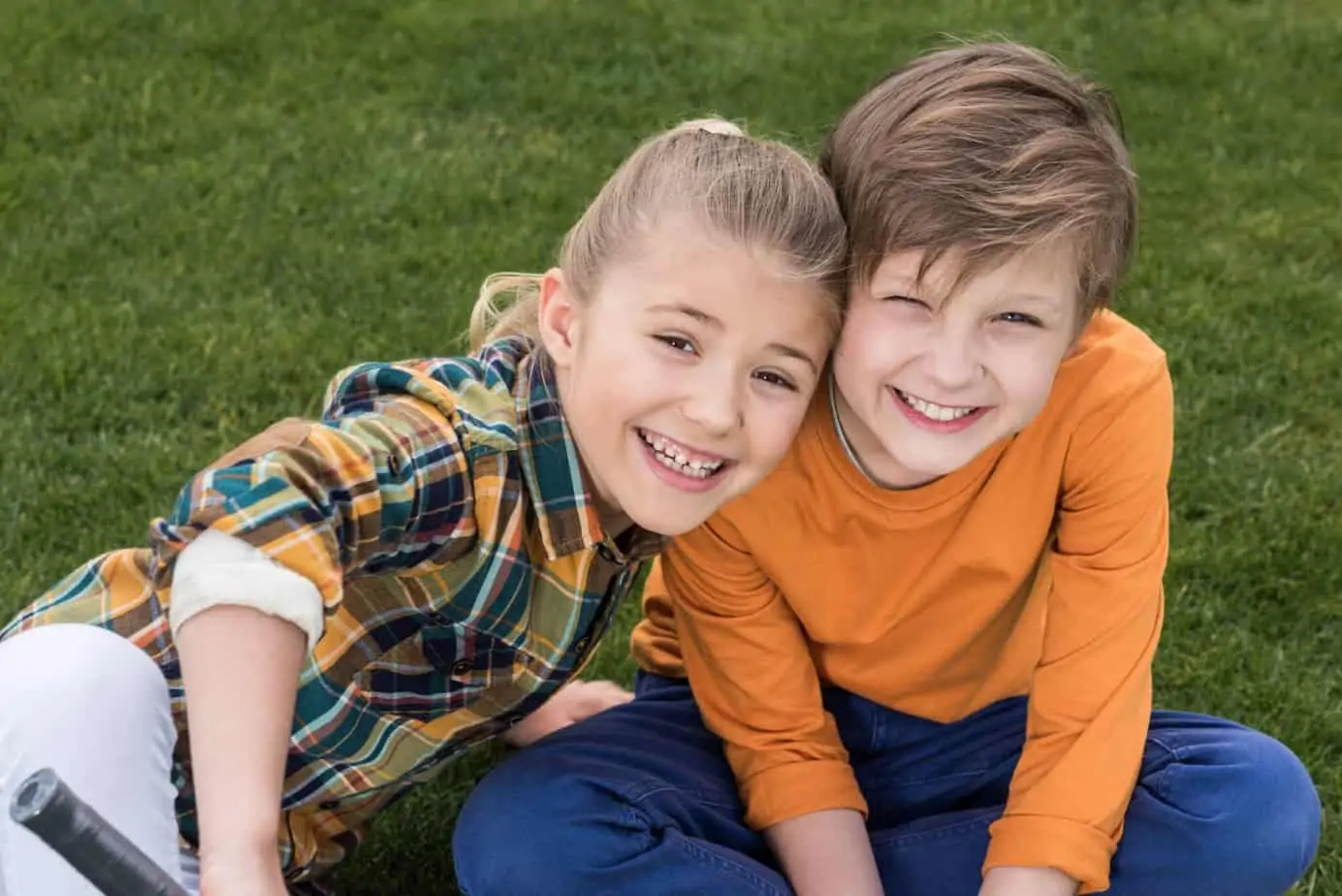Empower parents and children to halt negative talk in its tracks and therefore lay the groundwork for happy, resilient offspring well-equipped for whatever life throws their way.

Cultivating Positivity & Resiliency in Children
In my journey as a parent, I’ve discovered the profound impact of fostering positivity and a growth mindset in children. This revelation wasn’t immediate; it stemmed from observing the constant battle against negative talk and thinking that can easily ensnare young minds.
The quest for a solution led me to develop strategies that not only encourage positive reinforcement but also cultivate emotional intelligence, resilience, and a supportive, positive environment at home.
In the upcoming article, we will explore practical and effective methods for rewiring the brain for positivity in children, from the power of gratitude practice and kindness to specific coping strategies for accepting and managing emotions.
This guide aims to empower parents like us to halt negative talk in its tracks, thereby laying the groundwork for happy, resilient offspring well-equipped for whatever life throws their way.
Key Takeaways:
- Cultivating a positive mindset: Strategies to encourage positivity and growth mindset in children, combating negative thinking.
- Practical parenting techniques: From gratitude journaling to modeling resilience, actionable steps for a more optimistic household.
- Emotional intelligence and coping: Teaching kids to accept and deal with emotions in a healthy, constructive manner.
Understanding Negativity Bias
Our brains have evolved to scan for threats in the environment; this is known as the negativity bias. It was essential for the survival of our ancestors but now often leads to an overemphasis on negative experiences. This bias significantly affects our children’s emotional development.
Kids can become predisposed to focusing on the negative, impeding the cultivation of a positivity in children and a growth mindset. The key lies in understanding and acknowledging this inclination towards the negative. Once acknowledged, we can embark on a journey to rewire our children’s brains for positivity.
We can instill resilience, foster a positive environment, and develop coping strategies to manage emotions.
Recognizing negativity bias paves the way for positive reinforcement that celebrates growth, acceptance of emotions, and emotional intelligence, forming a robust foundation for positive parenting.
The Power of Embracing All Emotions
Accepting all emotions, both positive and negative, plays a foundational role in cultivating emotional intelligence in children. It teaches them that feeling a wide range of emotions is a part of life. This acceptance is crucial for child development as it helps them understand and manage their feelings more effectively, laying the groundwork for a healthy mindset.
By acknowledging emotions rather than dismissing them, we foster an environment where children feel safe to express themselves openly and watch as their emotional intelligence blooms.
This approach not only supports their emotional growth but also enhances their resilience, a key aspect of a growth mindset. Through this practice, children learn valuable coping strategies, equipping them with the tools needed to navigate life’s ups and downs with grace and positivity.
Ultimately, embracing all emotions sets the stage for emotional intelligence, a vital component of personal and interpersonal success.
Strategies to Foster Positivity
Rewiring the young, malleable minds of our children for positivity and a growth mindset demands a strategic approach.
It has been found that stopping negative talk and thinking forms the foundation of such transformation.
- Modeling resilience for children, I learned, plays a crucial part in this journey. Acting as a beacon for our kids, it shows them how to bounce back from setbacks. By teaching coping strategies and fostering a positive environment, we create a safe space for emotions and growth.
- Practicing daily shout-outs has proved invaluable. Recognizing even the smallest achievements nurtures a sense of accomplishment and well-being.
- Moreover, journaling for positivity, particularly through a gratitude journal, steers focus away from adversities towards gratitude. I journal most days and doing this in front of my kids has piqued their interest in doing this for themselves, too.
Turning Challenges into Opportunities: Unfortunately-Fortunately Game
Instilling optimism in our children often requires us to get creative – I definitely had to get creative!
Fun Activity to Play with Kids (or Yourself)
The “unfortunately-fortunately” game emerged as a brilliant strategy in this pursuit. In this activity, one starts by stating a situation with ‘unfortunately,’ which typically would elicit a negative response. Next, the challenge involves flipping the narrative by adding a ‘fortunately’ twist.
For instance, I might say, “Unfortunately, it started raining on our picnic.” My child would then have to find the silver lining, responding with something like, “Fortunately, we got to see a beautiful rainbow.”
Playing this game teaches our children the invaluable skill of finding positivity in every circumstance. It encourages them to stop negative talk and engage in a growth mindset. Through this playful method, they learn resilience, fostering a positive environment around them. Moreover, it rewires their brain for positivity, making gratitude practice and emotional intelligence second nature.
Modeling Resilience Through Mistakes
I had noticed I often shied away from discussing my setbacks in front of my children, fearing it would show weakness. However, I came to realize the power of openly addressing my blunders.
Sharing the lessons these experiences taught me helps foster a growth mindset in my kids. It emphasizes that mistakes are not failures but opportunities for growth and learning. They witness firsthand how I stop negative talk and negative thinking, transforming them into powerful lessons of resilience.
By practicing this, we foster a positive parenting environment that nurtures emotional intelligence and child development. Our kids learn the crucial coping strategies necessary for handling their own mistakes and setbacks. They understand the importance of positive reinforcement and how viewing obstacles as chances for improvement builds resilience.
This practice imbues them with the ability to rewire their brain for positivity, firmly planting the seeds for a lifelong journey of learning and adaptability.
Journaling for Positivity
I’ve found journaling to be a profound tool for fostering positivity in children. By committing daily to this practice or at minimum a few days a week, kids develop gratitude and a robust emotional intelligence.
It starts with encouraging them to note three things they’re grateful for each day. These can range from simple joys to major triumphs. This practice not only reinforces positive thinking but also introduces them to emotional regulation at an early age.
Moreover, this approach serves as a powerful antidote to the often automatic negative talk and thinking patterns. Through this daily ritual, children learn to rewire their brains for positivity, laying the groundwork for a resilient, growth-minded future. They learn that every day holds something positive, a lesson crucial for emotional resilience.
Besides, engaging in journaling together strengthens our bond, allowing us to navigate the complexities of emotions collectively.
By embracing this strategy, we invest in our children’s ability to appreciate life’s blessings, big and small. It propels them toward a fulfilling journey of self-discovery and emotional wisdom.
Practicing Daily Shout-Outs
I discovered the value of daily shout-outs as a transformative tool in our home and it’s been working great with my son.
It proved effective in not only stopping negative talk but also in fostering an environment of positivity and emotional intelligence among us. The practice involves taking a moment each day to recognize and voice appreciation for positive behaviors or achievements no matter how small. This can range from an act of kindness to a moment of resilience or a growth mindset demonstrated by our children.
What makes daily shout-outs so powerful is their dual impact.
Firstly, they serve as positive reinforcement, encouraging more of the behavior we want to see. It tells our children that we see them, we value them, and that their positive actions contribute to our family’s happiness.
Secondly, this practice deepens our connections, creating a supportive and positive environment where each member feels valued and motivated to contribute positively.
Including this practice became a cornerstone for cultivating positivity in our household. It effectively redirected focus from what was going wrong to all that was going right, reinforcing the important lesson that positivity, like flowers in a garden, thrives on attention and care.
The Role of Kindness in Cultivating Positivity
Kindness acts as a powerful catalyst in nurturing positivity in children, aiding them in the development of a growth mindset. Instilling the practice of kindness within our homes, we lay a foundation for children to understand and express gratitude. This forms a core part of positive reinforcement strategies that further deepens their emotional intelligence.
By demonstrating kind actions and words, we not only foster a positive environment but also empower our children to halt negative talk and thinking in their tracks.
Encouraging children to participate in acts of kindness, be it through simple daily shout-outs or engaging in community service, instills in them a profound sense of empathy and connectedness. Such activities contribute immensely to child development, enriching their capacity for fostering positive relationships. They learn through our actions; hence, modeling resilience through acts of kindness illustrates how to convert challenges into opportunities for growth.
Through these practices, we ensure the cultivation of a resilient, emotionally intelligent, and positively minded new generation.
Related: Raising Kind Kids: Teaching Intentional Acts Of Kindness
Exploring the World Through Wonder Walks
Wonder walks offer us a unique tool for sparking positivity and fostering a growth mindset in our little ones. They tug us gently away from the confines of indoor spaces, urging exploration of the vast, vibrant world outside.
On these walks, curiosity leads the way as we encourage our children to notice the details of nature—the shape of leaves, the dance of a butterfly, or the varied hues of the sky. This practice not only cultivates an environment rich in positive reinforcement but also seamlessly integrates learning and discovery into daily routines.
Through these exploratory journeys, children learn to stay present, imbuing each moment with significance. They adopt coping strategies for negative emotions, finding solace in the simple yet profound beauty of the world around them. Wonder walks, therefore, serve as a potent antidote to negative talk and thinking.
Wonder walks are great for gently rewiring our children’s brains for positivity, teaching them to marvel at our world’s wonders and fostering an emotional intelligence grounded in gratitude and resilience.
Staying Present: A Pathway to Positivity
In our journey towards fostering a positive environment, the practice of staying present has shown remarkable effects. It becomes a robust pathway to positivity. I discovered that this practice doesn’t just diminish stress; it also anchors us deeply in the here and now. This presence, in turn, nurtures an atmosphere where our children can thrive, free from the shackles of past regrets or future anxieties.
By focusing on the present moment, we teach our children an invaluable lesson. They learn to appreciate the beauty and lessons of the current situation, growing their emotional intelligence.
This process is instrumental in stopping negative talk and thinking, laying the foundation for a growth mindset. It empowers them to confront challenges with resilience, rather than being overwhelmed. Moreover, such moments of presence open doors to deeper connections, understanding, and acceptance among family members, reinforcing a culture of positivity and support.
Engaging in practices like wonder walks and journaling for positivity further solidifies this bond. It encourages us to notice and celebrate the small yet profound joys of daily life, thereby rewiring the brain for positivity.
Ultimately, these practices remind us that the journey towards cultivating a resilient, happy child begins with us staying present, patient, and positive.
Creating a Supportive, Positive Environment
Fostering a positive environment at home has remarkable effects on a child’s development. It lays the foundation for cultivating positivity in children, emotional intelligence, and a thriving growth mindset. The spaces where we live can shape thoughts, behaviors, and emotions. By understanding this, we can create surroundings that bolster positivity and resilience.
Tips for crafting this nurturing space involve simple yet profound changes.
- Gratitude practice becomes a cornerstone, transforming our home into a hub of appreciation. By focusing on gratitude, we not only encourage positive reinforcement but also teach valuable coping strategies.
- Modeling resilience in our daily interactions shows children how to navigate challenges. This behavior instills a sense of security and demonstrates healthy ways of dealing with emotions.
- Fostering a positive environment includes surrounding our family with reminders of kindness, achievements, and love. These reminders can be anything from artworks that inspire to family photos that bring joy.
By accepting emotions and incorporating practices like journaling for positivity and taking wonder walks, we open doors to emotional growth. It’s about creating a space where resilience training, positive parenting, and daily shout-outs become parts of our routine.
This, in essence, rewires our children’s brains for positivity, paving the way for their happy, resilient future.
Teaching Coping Strategies for Negative Emotions
Understanding how to maneuver through negative emotions marks a pivotal point in nurturing a growth mindset within children. I have discovered that acceptance and coaching on coping mechanisms are key. Kids need to comprehend that feeling upset, angry, or disappointed is a part of life. However, it’s the reaction to these emotions that lays the foundation for either a positive or negative outlook.
I always encourage implementing practical strategies. One effective technique is teaching kids to express what they’re feeling using ‘I’ statements. This empowers them to take ownership of their emotions.
Another tool is deep breathing exercises, which I’ve found to help them pause and gain perspective. I’ve also witnessed the impact of problem-solving together. It’s vital they learn that there’s usually a way to address what’s bothering them, which feeds into resilience training.
Promoting these coping strategies doesn’t just halt the cycle of negative talk and thinking. It actively seeds the landscape for emotional intelligence, fostering an environment ripe for child development and positive parenting.
The journey is about more than just averting negativity; it’s about equipping our children with the tools to thrive emotionally, reinforcing the bedrock of a growth mindset.
Encouraging a Positive Reflection
In our journey through ‘Cultivating Positivity,’ we’ve explored foundational strategies and practices vital for nurturing positivity and a growth mindset in our children. We began by understanding negativity bias and moved on to embrace all emotions, recognizing this as crucial for emotional intelligence development. We unveiled strategies that ranged from the fun ‘unfortunately-fortunately’ game to the powerful practice of journaling for positivity, emphasizing gratitude and resilience at every step.
- Daily shout-outs
- wonder walks
- fostering a supportive environment
- All of these tools further enriched our toolkit for building a house of positivity.
Kindness, we discovered, isn’t just an act but a way of being which transforms. By modeling resilience, accepting emotions, and practicing positive reinforcement, we can rewire our children’s brains for positivity. Each strategy, be it engaging in wonder walks or ensuring a positive reinforcement culture at home, plays a unique role.
Staying present has shown us the value of living in the moment, contributing to a stress-free and conducive learning environment. Coping strategies for dealing with negative emotions have equipped us to guide our children through life’s ups and downs, reinforcing the importance of a growth mindset in their journey towards emotional maturity.
As we embark on this path of positive parenting, let us remember the transformation doesn’t happen overnight. It requires patience, persistence, and practice.
Let’s commit to integrating these practices into our daily lives, fostering an environment where positivity thrives.
As you reflect on this guide, think about the small steps you can start taking today. Witnessing the growth and evolution of our children’s mindset towards one that is more positive and resilient will be a rewarding experience that underscores the power of positive parenting.
More Resources on Positivity & Mindset in Children
- 9 Ways to Encourage a Growth Mindset in Kids
- Parenting Mindset: How You See Your Child on Hard Days Affects Your Relationship
- Entitled Kids: What Entitlement Looks Like at Home & How to Fix It
- 28 Growth Mindset Quotes to Encourage Kids {Includes 4 Free Growth Mindset Posters}
- Helping To Develop Strong Coping Skills For Kids
- Navigating Puberty: Tween/Teen Hormonal, Physical, Emotional Changes
Want even more?
Shop All Parenting Resources
Shop all of our parenting resources from self-regulation tools and managing big emotions to building self esteem and confidence. There are resources for all seasons of life!








